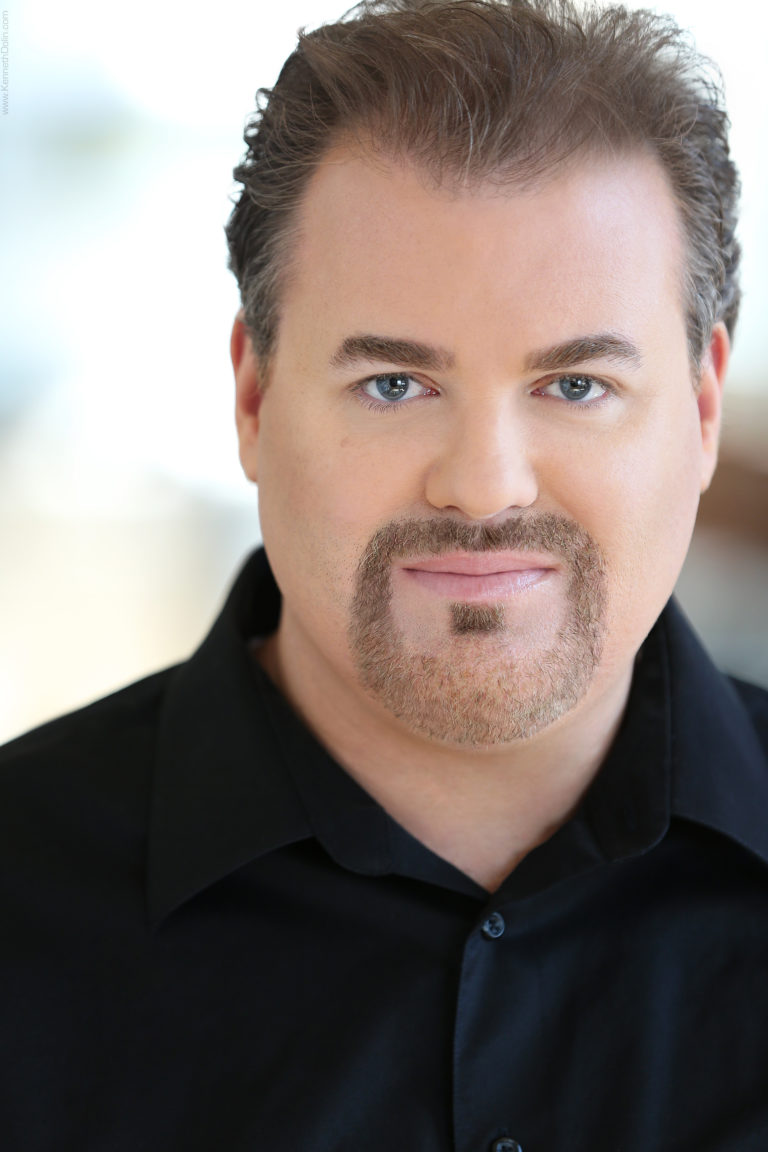Bruce Sledge
“The clarion-voiced, impressive” (New York Times) Lirico Spinto tenor Bruce Sledge has been praised for his “bright, attractive sound and superb technical skills” that he has shared with audiences at major opera houses around the world over his career spanning more than two decades.
Sledge made is role debut as Pinkerton in Madama Butterfly in a Metropolitan Opera “Live in HD” transmission seen by audiences in over 70 countries worldwide in the 2019-2022 season. He was also seen at UCLA’s Royce Hall as a tenor soloist in Rachel Fuller’s Animal Requiem. Recent engagements include covering the title role of Die Meistersinger von Nürnberg and Bacchus in Ariadne auf Naxos at the Metropolitan Opera, a reprisal of the role of Paolo Erisso in Rossini’s Maometto Secondo with Washington Concert Opera, and his role debut as Don José in Opera Colorado’s Carmen. In the 2022-2023 season, Sledge returns to the Metropolitan Opera to cover the title role in Lohengrin and the role of Sergei in Lady Macbeth of Mtsensk.
In recent seasons, Sledge returned to the Deutsche Oper Berlin for performances of Jean in Le Prophète and to the Welsh National Opera as Lorenzo in The Merchant of Venice and Macduff in Macbeth. He was praised by Opera Wire for his “dramatic versatility” for his portrayal of Bacchus in the Santa Fe Opera’s Ariadne auf Naxos, and Opera Canada raved that his “radiant, voluminous tenor and ease with language” as Lord Riccardo Percy in Anna Bolena with the Canadian Opera Company was “spot-on.” A regular roster member of the Metropolitan Opera, Sledge made his debut as Almaviva in Rossini’s Il Barbiere di Siviglia, followed by performances as Ferrando in Mozart’s Così fan tutte, Tamino in Mozart’s The Magic Flute, Don Ottavio in Mozart’s Don Giovanni, and King of Naples in Thomas Adès’s The Tempest.
Sledge counts among his career highlights singing the role of the Duke of Mantua in Rigoletto with companies including Vancouver Opera, Boston Lyric Opera, Tulsa Opera and in Avenches, Switzerland; Paolo Erisso in Rossini’s Maometto Secondo with the Canadian Opera Company and Santa Fe Opera; Leicester in Maria Stuarda with the Minnesota Opera, Welsh National Opera and Swedish National Opera; Count Almaviva in Il Barbiere di Siviglia with the Hamburgische Staatsoper and Tulsa Opera; Leicester in Elisabetta, regina d’Inghilterra with the Rossini Opera Festival; and Ernesto in Don Pasquale at the Deutsche Oper in Berlin, Teatro Regio di Torino, Teatro Comunale di Bologna and New York City Opera. He performed the role of the Italian Tenor in Der Rosenkavalier at the Lyric Opera of Chicago; Léopold in La Juive at La Fenice; Alfredo in La Traviata at the Royal Danish Opera; Ferrando in Così Fan Tutte at the Pittsburgh Opera; and as Tonio in La Fille du Régiment on the Teatro Comunale di Bologna’s tour to Savonlinna. As Vladimir Vladimirescu and the Fisherman in the double-bill of Mozart’s The Impresario and Stravinsky’s Rossignol at Santa Fe, Sledge “sang with appealing lyricism” and “performed to glorious poetic effect” (Opera News).
As a concert soloist, Sledge has performed in The Defiant Requiem in Asheville, NC and Vienna, Verdi’s Messa da Requiem with the Spoleto USA Festival and the Radio Television Ireland Orchestra in Dublin, Mendelssohn’s Elijah with the National Symphony, Schubert’s Mass No. 6 with the San Diego Symphony, Beethoven’s Missa Solemnis with the Berkeley Symphony, and he has sung with the Risca Male Choir in Wales and Opera Companies of Tampa, Atlanta and Hong Kong. Several appearances with the San Francisco Symphony have included Mozart’s Requiem, Stravinsky’s Pulcinella, and singing as the Shepherd in Oedipus Rex and soloist in Schubert’s Mass No. 6 under Maestro Michael Tilson Thomas. With the Gulbenkian Foundation in Lisbon, he has performed concerts of Bartok’s Cantata Profana and Kodaly’s Psalmus Hungaricus, and sang Brahms’ Liebeslieder Walzer with the New York City Ballet. Sledge appeared in recital at Carnegie’s Weill Hall in celebration of Marilyn Horne’s 75th Birthday.
Bruce Sledge recorded the role of the Fox in Spanish and Catalan versions of Janacek’s The Cunning Little Vixen for the BBC with Kent Nagano, has been seen on the NBC sitcom Scrubs, and can be heard on the soundtrack of the motion picture The Sum of All Fears.
Sledge was a finalist in the 2002 World Voice Masters Competition in Monte Carlo, a finalist in Placido Domingo’s Operalia 2000 World Opera Contest, and a national finalist in the 2000 Loren L. Zachary Vocal Competition. In 1998, he was a Western Regional Finalist in the Metropolitan Opera Auditions and was awarded first place in the Los Angeles Chapter of the National Association of Teachers of Singing (NATS) Competition. Bruce Sledge received his master’s degree in vocal arts from the University of Southern California.
Current & Upcoming Performances
Past Performances
Maometto II – Washington Concert Opera 2021
“Tenor Bruce Sledge matched Crocetto with both heraldic power, from his first dramatic entrance in Act I, and expressive beauty. Sledge could not only hold his own against the full orchestra: he was also a sensitive partner in the many duos and trios with the higher voices, including the Terzettone, with its exquisite triple cadenza for the three singers.” – Charles T. Downey, Washington Classical Review
Anna Bolena – Canadian Opera Company 2018
“Bruce Sledge as Riccardo Percy was the only one among the principals who sounded a natural in this musical idiom. His radiant, voluminous tenor and ease with language brought us the only spot-on Donizettian singing in the show…” – OperaCanada.ca
“Sledge’s agile and splendid voice give us a very good performance.” – James Karas Reviews and News
Ariadne Auf Naxos – Santa Fe Opera 2018
“Tenor Bruce Sledge showed dramatic versatility as The Tenor/Bacchus — he was the perfect divo in the Prologue, whose hefty voice complemented Echalaz’s voice well in the final scene.” – Opera Wire
“Sledge’s voice displayed the spinto weight to be a creditable Bacchus, one of the shortest of the German heldentenor roles.” – Opera Warhorses
“Bruce Sledge (Percy in the recent COC Anna Bolena) with his fearless high register was terrific as Bacchus—a role that has caused so many tenors to crash and burn!” – OperaCanada.ca
As Vladimir in The Impresario, and The Fisherman in Le Rossignol at Santa Fe Opera
“Bruce Sledge sang with appealing lyricism as Vlada’s henpecked husband, then performed to glorious poetic effect as the Fisherman” – Simon Williams, Opera News, November 2014
As the Duke of Mantua in Rigoletto at Boston Lyric Opera
“Tenor Bruce Sledge sang the role of the Duke with fluidity and ardor…” – Jeremy Eichler, The Boston Globe, MARCH 16, 2014
“As the Duke of Mantua, his [Bruce Sledge’s] voice came off strong and nimble with a dexterous feel for Verdi’s style. He delivered the famous “La donna è mobile” with crispness, and his sweet, cooing arias to the various women in the story gave the diabolical character a charming veneer.” – Aaron Keebaugh, Boston Classical Review, March 15, 2014 at 2:02 pm
As the Earl of Leicester in Maria Stuarda at Welsh National Opera
“Bruce Sledge is all the same in fine, ringing voice, with that spinto quality.” – Stephen Walsh, theartsdesk.com, Saturday, September 14, 2013
“Elizabeth and Mary both have their desires set on the Earl of Leicester and, thanks to Bruce Sledge’s charming performance in this role, the audience can understand why.” – Jacqui Onions, The Public Reviews, September 14 2013
“Bruce Sledge as Leicester singing with a gloriously heroic tone, and their duet in Act II was a beautiful moment.” – Mark Ronan, September 14, 2013
“Bruce Sledge proved a robust Leicester” – Mike Smith, WalesOnline, September 14, 2013
“The great singing, easy and stylish, comes from Sledge.” – Tim Ashley, The Guardian, September 16, 2013
“Bruce Sledge sings honorably as Robert, Earl of Leicester, who here is in love with Mary and (unfortunately for Mary) the object of the jealous Elizabeth’s affections.” – George Loomis, The New York Times, September 17, 2013
As Paolo Erisso in Maometto Secondo at Santa Fe Opera:
“Erisso, the leader of the Venetians in Negroponte (here the clarion-voiced, impressive tenor Bruce Sledge) …” – Anthony Tommasini, The New York Times, July 30, 2012
“What tenor shortage? As in the company’s other productions this year Santa Fe Opera served up yet another terrific high-voiced singer. Bruce Sledge sang Erisso with vibrancy, a rich Italianate timbre, and thrilling top notes.” – Lawrence A. Johnson, Classical Review, August 3, 2012
“The opera demands four singers who can expertly shape Rossini coloratura into dramatic characterization, but only tenor Bruce Sledge (Erisso) was consistent and interesting.” – Heidi Waleson, Wall Street Journal, August 13, 2012
“Tenor Bruce Sledge as Anna’s father, Erisso, offered a powerful voice and ringing high notes.” – Sarah Bryan Miller, St Louis Post Dispatch, August 11, 2012
“But it’s the singing that counts most here, and the cast is splendid. […] As Anna’s father, tenor Bruce Sledge displays a bright, attractive sound and superb technical skills.” – Mike Silverman, Associated Press, August 5, 2012
“Also impressive was Bruce Sledge as Paolo, who poured out the warrior’s resolve with a clear, shining tenor and commanding coloratura.” – John von Rhein, Chicago Tribune, August 4, 2012
“Anna’s father, Erisso, is the leader of the Venetians in Negroponte. Tenor Bruce Sledge sings the role with ringing sound that puts the piddly brass in the orchestra to shame. He also negotiates the coloratura hurdles Rossini constantly places in his way with easy and dramatic flair.” – Gregory Sullivan Isaacs, Theater Jones, August 3, 2012
“By the time Maometto arrives on the scene, the audience has already been duly impressed by the rest of the cast. Tenor Bruce Sledge, in the immensely demanding part of Paolo, is not less impressive than Pisaroni. Though agile, his voice is dark for a Rossini tenor, yielding an interpretation that is both honeyed and heroic — an ideal combination for this leader who strives to balance concern for his daughter with the ruthlessness of battle. He is unswerving in his military standards, but his heart has not crusted over, as we hear in Act II when Sledge spins out the Mozartian line of ‘Tenera sposa,’ a lament addressed to his late wife. He sang everywhere with absolute authority. I doubt that the male leads in this opera could be better cast in the world today.” – James M. Keller, The New Mexican, July 15, 2012
“Tenor Bruce Sledge has also sung at the Met. His repertoire consists of mostly lyric parts. But the large sound he projected in this opera suggests that he could easily move on to heavier roles. His singing of Erisso, Anna’s father, was secure and technically adroit. His sound is well produced. Rossini’s fireworks gave him no problem.” – Neil Kurtzman, Medicine & Opera, July 15, 2012
“Another great surprise was tenor Bruce Sledge, whose big, clear voice displayed flexibility and shine.”Sebastian Spreng, Knight Arts, August 11, 2012=
“Bruce Sledge is Anna’s tormented father, an energetic role he dispatches with finesse.” – John Stege, SF Reporter, July 18, 2012
“Bruce Sledge played Anna’s father Paolo Erisso and was robust and flexible.” – Brian Holt, Out West Arts, July 29, 2012
“Tenor Bruce Sledge conferred nobility on the role of Erisso. […] Each character had moments of beauty, but Maometto achieves greatness in Rossini’s trios, sung with elegant line by Pisaroni, Crocetto, and Sledge.” – Georgia Rowe, San Francisco Classical Voice, July 31, 2012

